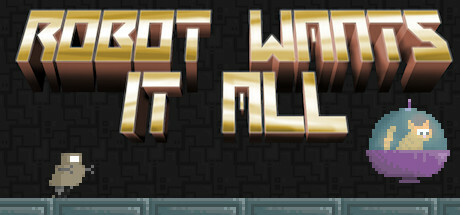
Looking back over 2021's many Indie Game of the Week entries I realize I've developed a bit of an explormer addiction over these months in quarantine, so what better way to rehabilitate myself than by playing eighteen of them at once, smoking the entire carton as it were? That's the insane deal you'll receive when you purchase Robot Wants It All, a compilation of all the Flash/browser-based explormers created by Hamumu Software over the years in which a mechanical being invariably demands a thing and platforms around precarious mazes until they reach it.
Reading the game's description I figured Robot Wants It All would simply present all six of its "Robot Wants" entries - including one built specially for this bundle, Robot Wants Justice - as a simple list, but the truth is far more involved. Initially, only the first game in the series (Robot Wants Kitty) is unlocked: the rest need to be purchased with currency you either earn while playing the games or are rewarded afterwards as a completion bonus. This bonus can increase or decrease depending on various factors such as your completion time, weapon accuracy, total number of deaths, and special conditions like avoiding killing enemies as much as possible (or killing all of them) or finding all the collectibles, if applicable. Each game first presents to you its "Easy" mode, in which you get a smaller map and a slightly truncated version of the progression chain, with the option to unlock the "Classic" map (a recreation of the original version) and a "Remix" version (a much harder and larger map). Added to this are mutators like those found in Supergiant's games: optional settings to make the game harder that also increase the payouts in turn.
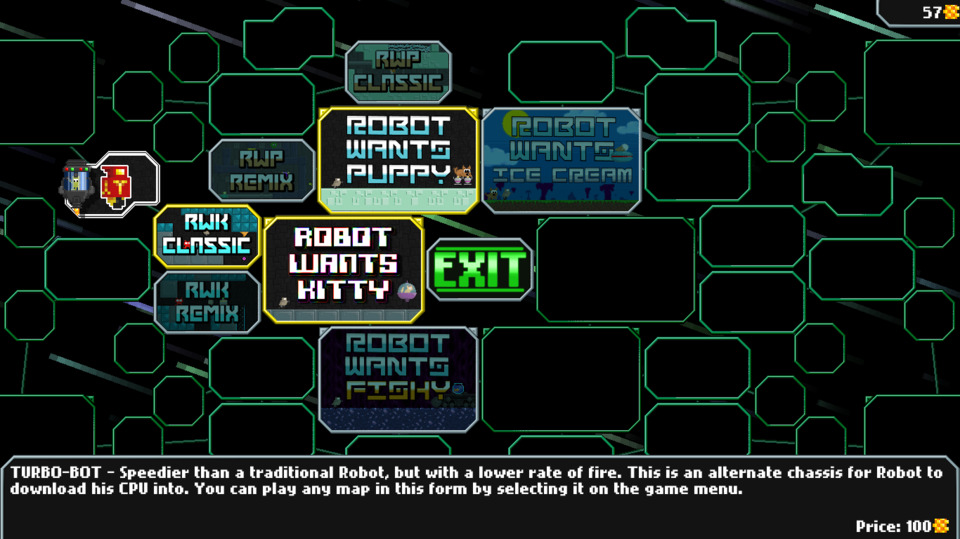
While I was a little skeptical of this progression system initially, as it seems to favor a speedrunner approach as opposed to the languidly-paced exploration I'm more into, the post-game rewards have been significant enough that I've usually been able to unlock a new map to play immediately after the conclusion of the previous. Excess funds, if any, have been going towards optional content like little history blurbs for each game, new alternative skins for the titular robot protagonist which can sometimes offer gameplay tweaks, and new mutators to tinker around with. Individual maps range from being a mere five minutes long if you're speedy to almost an hour for the larger Remix ones, and with the cash incentives to play quickly and accurately it has more of an arcade sensibility than most games in this sub-genre. Controls-wise the platforming and combat are usually fairly concise though I've had trouble registering hitboxes at times, even if that's something that isn't usually a problem in pixel games. Dying and respawning happens so fast that you'll regularly fail to register what just killed you, which is probably more of a positive on the whole but does allow doubt to fester in your mind as to whether or not everything's on the up and up.
Each game has different traversal upgrades, some of which don't even let you start with a jump until you find the right power-up, and will often have their own rules to follow. Each one also tweaks the ratio of platforming:combat:puzzles to create more distinct playthroughs, with the Easy, Classic, and Remix versions of a given game offering the same mechanics but with different map layouts. Hence why I would argue that, even though the game presents itself as six games in one, it's actually eighteen in one (albeit, eighteen bite-sized maps that you could bash through in a handful of sessions, in case it sounds overwhelming). The mutators and having different award targets to chase bolsters that longevity further, making Robot Wants It All similar to another platformer I played recently - Love 2: Kuso by Fred Wood - in that the game recognizes its shortcomings (specifically its literal shortness) and builds a meta game model around it that turns that brevity into a strength. Even if it takes you a mere ten minutes to clear a map, you have the option to jump back in to complete it even faster for greater rewards that can go towards many unlockable features, or play in pursuit of a particular objective if you're trying to unlock the game's enigmatic achievements, or simply move onto one of the other seventeen maps available. I've already cycled through the Easy intro-level maps for each of the six games to get a feel for them all and am now working through the bigger Classic maps, and it's been satisfying coming back to the in-game store between games to unlock a new mode or buy some extra features which in turn unlocks even more to browse in the shop's skilltree-like structure.
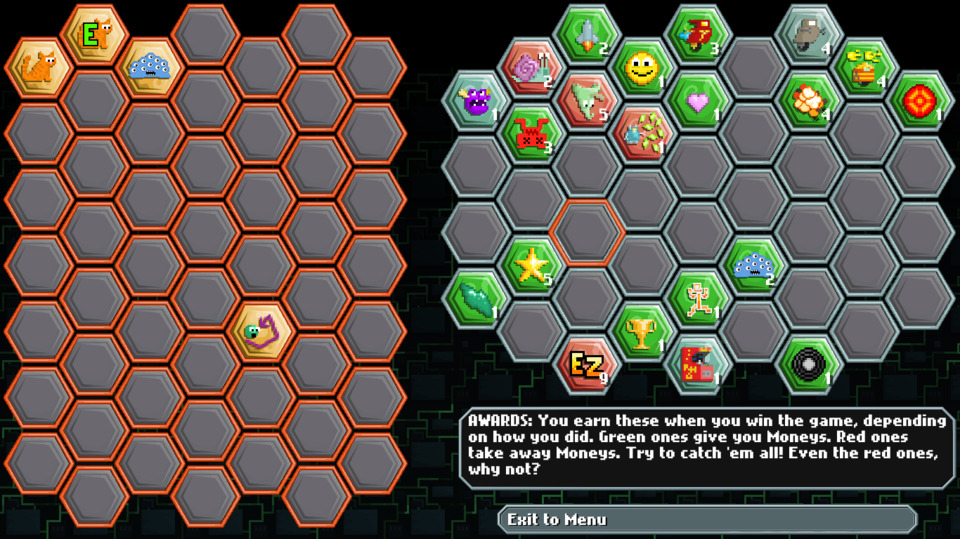
As for the differences between each game, that's where this package starts to feel a bit repetitive. It's not quite Kirby Super Star, for as similar as it is in the sense it unlocks harder games as rewards for completing the easier ones, as the Robot Wants games use a very similar engine (due to them all being remastered with the same tech) with the same fundamental mechanics for the most part. Robot Wants Kitty, the first of the six, is the archetypal mini-explormer: there's an even balance of combat and platforming and a non-linear map that starts you right next to your feline target, except with a barrier in the way that you can only overcome by finding all the traversal upgrades in order. Robot Wants Puppy, the follow-up, is different in that it uses the kitty found in the previous game as your partner: combat involves launching the kitty at enemies to claw apart and then remembering to pick the little guy up afterwards, at least until you get the upgrade that recalls the fuzzy wonder instanter. Other upgrades also involve the kitty in some way: using the tail as a helicopter to glide over wide gaps or the cat's sharp claws to walk across ceilings, for examples. Robot Wants Fishy has larger, more challenging subterranean maps that are separated by a central teleportation system, thereby splitting progression across four distinct paths. Upon acquiring a new upgrade, the trick to completing the map quickly is remembering which of the four routes had a roadblock you can now overcome. It also makes use of floaty underwater physics, which is one of the game's clear weaknesses (that is, unless either of the two larger Robot Wants Fishy maps include a better swimming upgrade to mitigate it; I've not tried them yet).
The fourth game, Robot Wants Ice Cream, is much more combat-focused. There are fewer upgrade types but each are heavily iterative - four or five power-ups apiece - and can be found all over the place: some might increase your firepower damage, some might increase the bullet spread, others give you a means to use a smart bomb with further upgrades that allow you to use it more often and increases the rate at which it regenerates. It also has a pathetic double-jump that you have to keep upgrading until the second hop finally matches the first in distance travelled. It's also one of the more linear games in this series. The fifth, Robot Wants the Letter Y, is a bit more cerebral in that it tasks you with completing environmental puzzles to reach new upgrades: this might include using a reflective laser to hit buttons at angles, switching platforms between active and inactive states, or dropping EMP mines to temporarily disable barriers. The final game, Robot Wants Justice, includes an optional goal to save all the alien "Derpoids" by touching them and letting your puppy partner teleport them to safety but is otherwise a linear affair with a unique offensive rocket punch upgrade that also acts as a mid-air dash. It does have a curious final boss however: a cloning machine that spits out one-eyed purple leapers that you can defeat in a pacifist run by letting the clones leap towards you only to fall into the lava underneath, rather than pushing them in yourself.
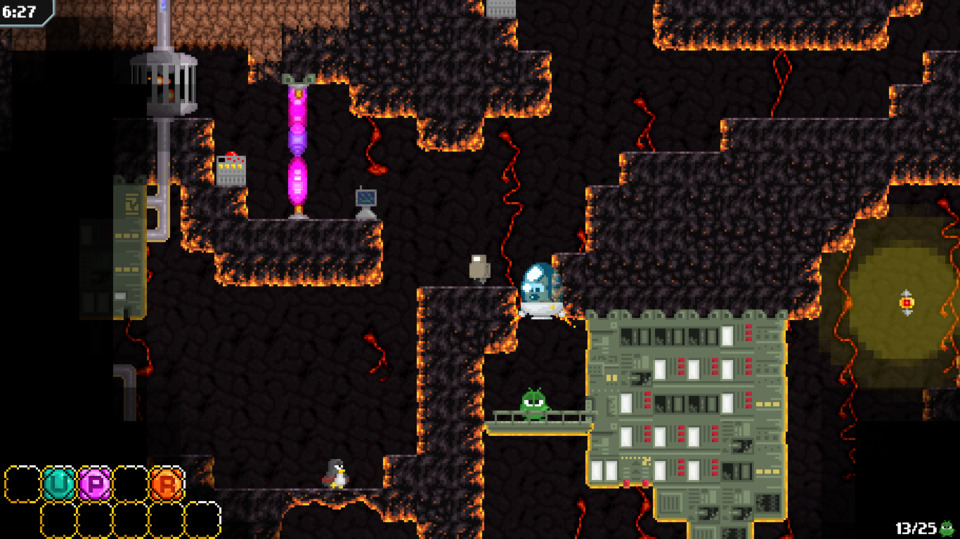
While I don't think any of the individual games are all that much to write home about, or write on a website about in my case, the sheer quantity of game modes offered here and the meta gaming manner in which they're incrementally doled out does add a great deal to this package. I suppose another close equivalent, in addition to those mentioned above, would be Digital Eclipse's various Mega Man Legacy Collections: each included game comes packed with so many extras to peruse that the front-end trappings surrounding the compilation could be said to be as much of a value add as the individual games themselves. In Robot Wants It All's case, it's also a smart way to adjust for the simple fact that these games, as deliberately breezy browser-based games meant to be conquered over a lunch break, are best served by this gaggle of highscore-chasing incentives and longevity-boosters rather than the no-frills list of six pretty similar, rudimentary explormers the developer could've easily presented them as. If you've ever spotted or engaged with one of these "Robot Wants" games in the wild, this set seems like the ideal way to consume the whole franchise.
Rating: 4 out of 5.
| < Back to 241: Forever Lost: Episode 3 | The First 100 | The Second 100 | > Forward to 243: Creepy Tale |
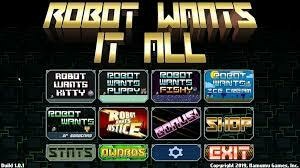
Log in to comment